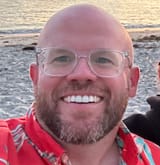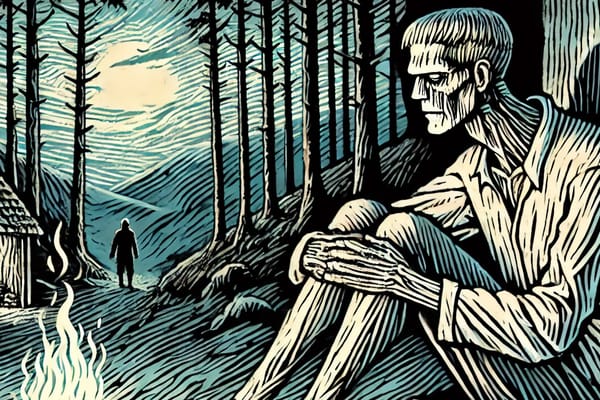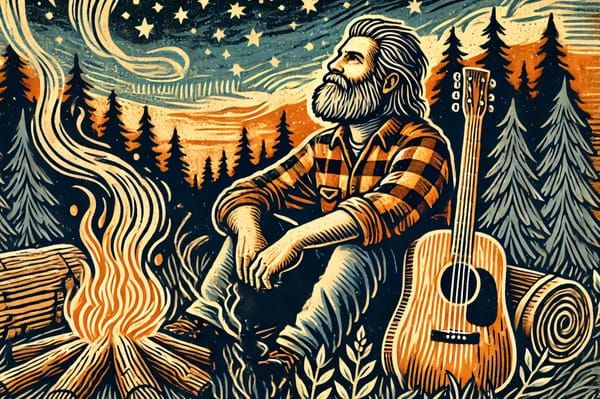Newsletter #4 - Think of What You Can Do With What There Is
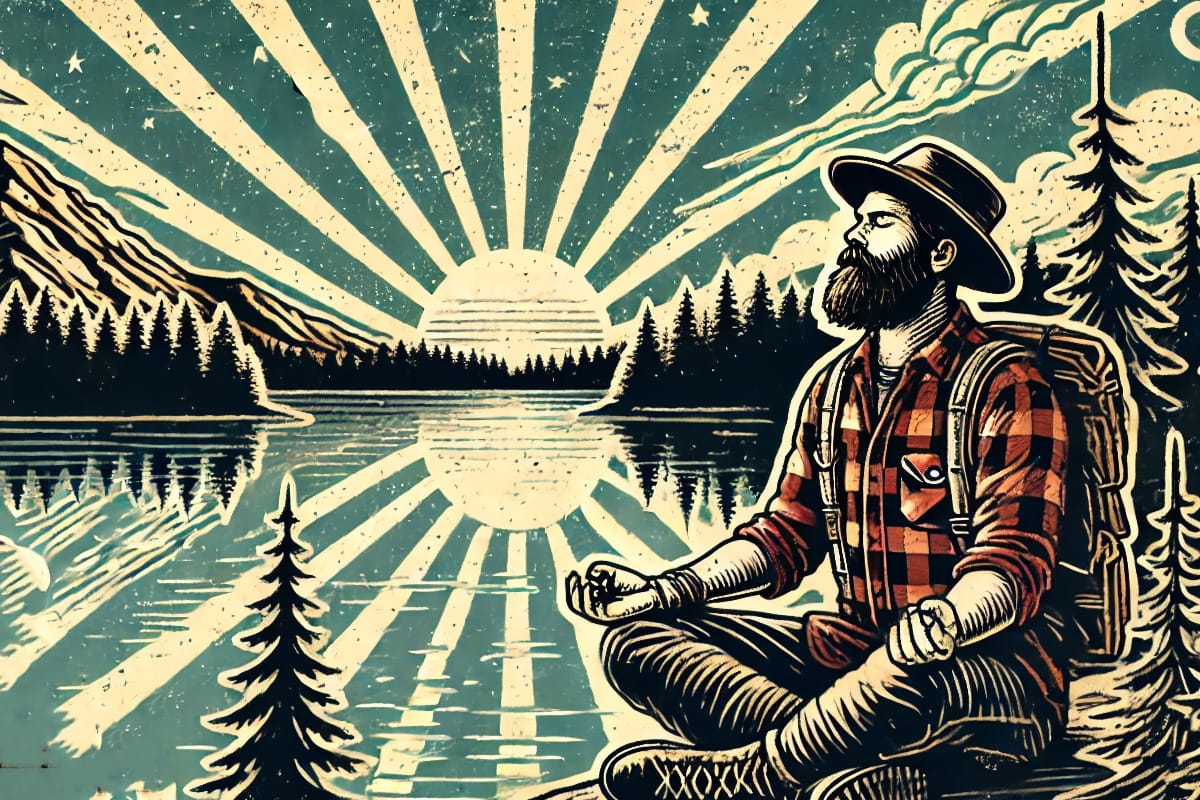
Welcome to The Wild Gentleman newsletter.
In the spirit of adventure and continued growth, I undertook a personal development project last month, incorporating a combination of reading, learning, and practice. It has added more richness and meaning to my days than I ever could have imagined. I share that experience below.
September also brought our second book club meeting, which was not only an incredible conversation to be a part of but also included some shared wisdom on organizing priorities and finding daily success in what really matters. It was great to hear that some members have already put the advice to good use.
Read on.
Updates
We have our third in-person The Wild Gentleman Book Club meeting scheduled for this Wednesday, October 15, at 6 PM, upstairs at Paddy's in Newton.
The book club selection for September was Ernest Hemingway's The Old Man and the Sea.
If you are coming to our next get-together, RSVP here: The Wild Gentleman Book Club - Meeting #3 - The Old Man and the Sea
More below...
Latest Blog Posts
- Earlier this week, I published "In Search of a Mentor." This was one of the more personal blog posts I've put out into the world thus far, and it took a lot of focused writing and editing time to get to a place I thought was right. Shoot me a note to let me know your thoughts, if you've got them.
- For last month's book club, The Wild Gentleman published "Man's Search for Meaning: A Reader's Guide for The Wild Gentleman Book Club" to prepare for that evening's discussion.
The Wild Gentleman - Wild at Heart. Refined in Mind.
The Wild Gentleman Book Club
As mentioned above, the second The Wild Gentleman Book Club get-together took place in mid-September, and it was an incredible experience.
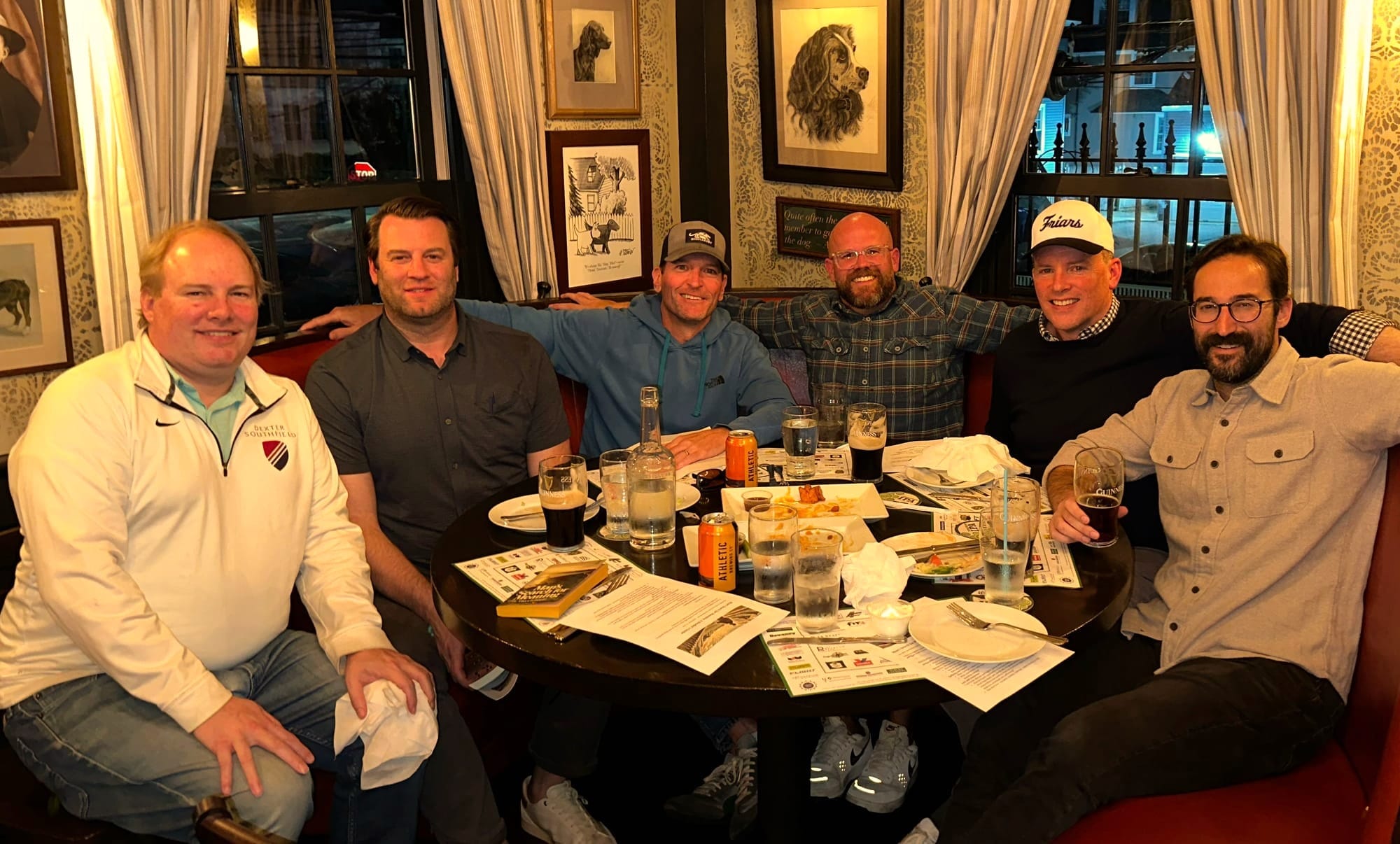
Both in-person meetings have been precisely what I'd hoped they would be when I started The Wild Gentleman: authentic, introspective, and probing. It is quite an experience to sit around a table with a group of guys and discuss issues that range from the silly to the profound and personal.
We will be meeting once again at Paddy's Public House in Newton this week.
As I've mentioned before, the focus of the in-person component of The Wild Gentleman is to create an opportunity for men from all sorts of different backgrounds to come together to talk life, share questions we ask ourselves, discuss the challenges we face, and yes, to chat about the book selection of the month.
The book club is now open to anyone interested in discussing life and books, or simply hanging out. Shoot me an email at dennis@thewildgentleman.com if you have any questions.
- I know everyone is busy, and it's okay to listen to a reading of the month's book club book. You can find versions of The Old Man and the Sea here: Audible | Spotify
- You can listen to the entire audiobook on a short drive before Wednesday!
- Even if you didn't read the book, but want to come and experience what has been one of the highlights of the last few months, at least for me.
Please RSVP and join us!
The book selection for September of Ernest Hemingway's The Old Man and the Sea was selected via an Instagram poll (You can also follow The Wild Gentleman on Instagram if you don't already).
If you've never read The Old Man and the Sea, or haven't read it in a while, I highly recommend the book. I'm excited that this book was selected and look forward to discussing Hemingway's epic sea adventure, told through the tale of Santiago, the Cuban fisherman. It's a book I loved teaching in my English teaching days.
The Old Man and the Sea is deceptively simple but endlessly profound—there are so many threads to explore. I'm looking forward to seeing where our conversation takes us.
Here is one example of the richness that can be culled from Hemingway's story, as Harvard philosopher Sean Kelly and Lex Fridman discuss the existential meaning of the novella. This conversation touches on several themes central to The Wild Gentleman; Kelly points out Hemingway's esteem of risk and adventure as a virtue of manliness, while Fridman notes how the book is more about what it means to be a man looking toward old age, either in the distance or far nearer.
Check it out:
The Old Man and the Sea is short but full of meaning. A conversation at our last book club meeting about finding better habits and meaning led me on an introspective adventure last month, with quite surprising results.
Take a Breath (And Stay with It)
I've been trying to build a meditation practice, on and off, for twenty years.
I'd start strong—read a book, download an app, set reminders, commit to the practice—and inevitably get lost and forget my habit-building goals within a week or two. It wasn't a discipline problem. It was my approach that treated meditation like a goal-oriented and achievement-guided program, as a self-improvement metric to master.
At the September book club meeting, our conversation on Man’s Search for Meaning led to a range of topics, including ways we motivate ourselves, how we cultivate gratitude in each day, how we organize our time, and how we find calm amid the chaos of our lives.
Someone shared their nightly habit of setting the top priorities for the morning and how it made a difference in the success of their days. Highlighting what matters most to do first sets up higher-quality days overall. (Another Wild Gentleman at the book club meeting shared with the group later that week that he had applied that approach himself and was finding an array of benefits with the more successful start to his days.)
The entire discussion shifted my perspective on building habits. The question shouldn’t be, “How do I force myself to get this task done?” A better way is to ask, “Why does this actually matter to the life I'm trying to live?"
Pondering this also made it clear that The Old Man and the Sea was the right book to read for October. Santiago spends days alone at sea with nothing but his thoughts, his struggle, and the great marlin. And yet he perseveres. Even alone, there is a deep meaning to his life. Hemingway writes: "Now is no time to think of what you do not have. Think of what you can do with what there is.”
This is what meditation actually is—not achieving some zen state momentarily, but learning to be alone with the challenge of whatever each moment has to offer, to stay present with difficulty, to not run from what's hard.
When I started Sam Harris's Waking Up course in August (along with reading his book of the same name), something finally clicked. The shift was understanding I wasn't trying to win a battle against endless thoughts. I was learning to become conscious of thought itself—to observe what arises without judgment or attachment.
I incorporated Harris's guided sessions into my morning routine—typically 10-20 minutes, like most meditation programs. But the approach was completely different. Harris discusses consciousness itself—the awareness underlying all our thoughts and reactions. For the first time, I wasn't meditating to become a better person. I was meditating to actually be present with who I am.
Two months in, I'm finally consistent. Sometimes multiple sessions a day. And I feel more in touch with my thoughts—not controlling them, not judging them, just aware of them—than I ever have before.
This connects directly to The Wild Gentleman's mission. We're not here to perform some ideal of masculinity. We're here to develop our consciousness—the awareness—to see ourselves clearly and make better choices from that place. Like Santiago staying present with his struggle, like The Wild Gentleman book club members building more meaningful habits, like finally understanding that meditation isn't another thing to conquer—it's a practice of being awake to your own life.
If you want to try it yourself: Waking Up shared a code that gives new users three free months of access. I'd love to hear about your experience.
Promo code: WU7A-A1B66AB36F
Redeem: wakingup.com/redeem
The Gentleman Shares - Recent Thought-Provoking Reading
"Thomas Pynchon's America" - by A.O. Scott, The New York Times.
Thomas Pynchon is not an easy read. He is esoteric. He can be absurd. His character names and playful use of acronyms can boggle the mind. He was the focal point of my (unfinished) master's thesis. This piece breaks down all his work for those unfamiliar with it, as the somewhat reclusive author just published his latest work, Shadow Ticket. I would recommend The Crying of Lot 49 or Vineland as starting points if you've never read his work. (Vineland is the book that Paul Thomas Anderson used for inspiration for his recent movie, "One Battle After Another.")
"Why Concord? The geological origins of the American Revolution "- by Robert A. Gross and Robert M. Thorson, The Atlantic.
For those who love local history, this is a breakdown of how the natural environment of Concord made it a central location in the unfolding of the War of 1776, as well as in the later transcendental movement of Emerson and Thoreau.
"The Back of the World - The troubling genius of G. K. Chesterton" - by Adam Gopnik, The New Yorker
Similar to Thomas Pynchon, G.K. Chesterton is a challenging author to read. If you've never read The Man Who Was Thursday, give it a try; however, be warned that it becomes absurd and dark midway through. I knew Chesterton had some faults, and this piece breaks down both the visionary aspects of his writing and the dark, disturbing, racist side of the English writer.
How to Help the Wild Gentleman
- Keep sharing ideas, book recommendations, blog ideas, and more to dennis@thewildgentleman.com
- Spread the word! Here is a link you can share for The Wild Gentleman signup page: Signup.
Please share any ideas with dennis@thewildgentleman.com
Until next month—keep reading, keep questioning, keep doing the things that scare you a little.
